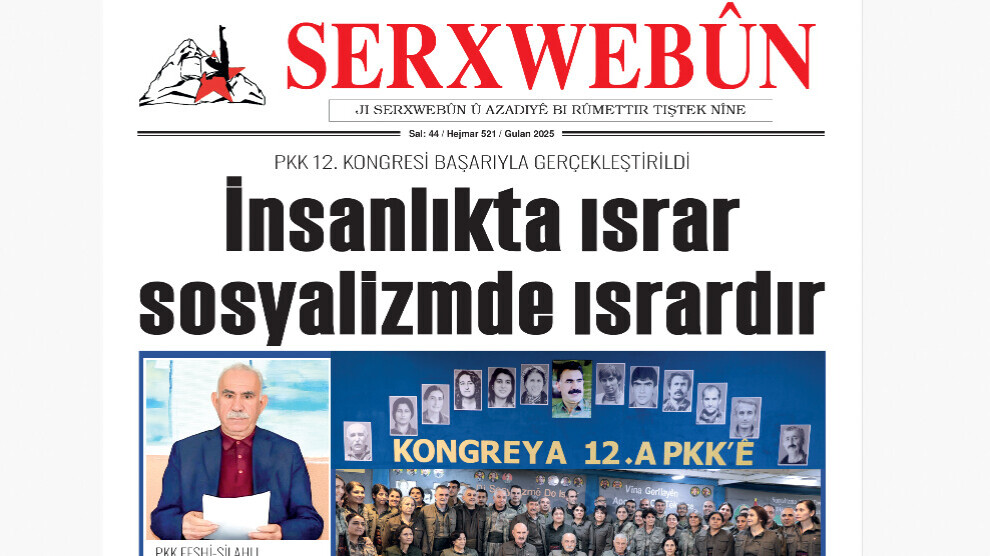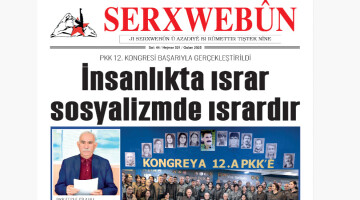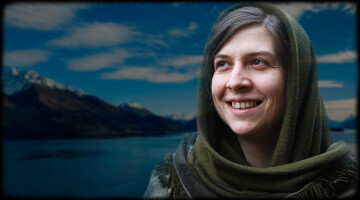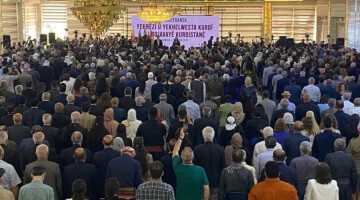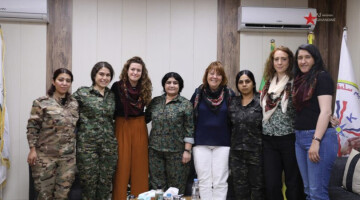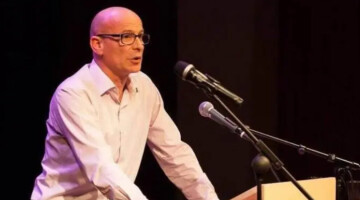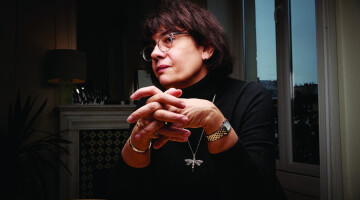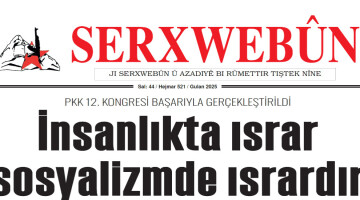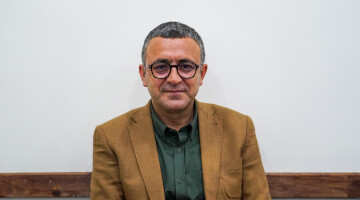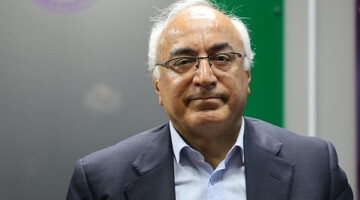The latest issue of the Kurdish monthly Serxwebûn is entirely dedicated to the 12th Congress of the Kurdistan Workers' Party (PKK), featuring for the first time the perspectives submitted by Abdullah Öcalan from his prison cell on the Turkish island of Imrali. Issue No. 521 also marks the end of the publication's 44-year uninterrupted history. The editorial board describes this decision as a deliberate conclusion made "for the sake of new and stronger beginnings."
Alongside Öcalan's strategic reflections, the issue contains the full transcripts of the congress's opening and closing speeches, adopted resolutions, and delegate contributions. It also includes biographical texts on PKK figures such as Ali Haydar Kaytan and Rıza Altun, as well as commemorative pieces on Pelin Yılmaz (Pelîn Zozan), Gurbet Aydın (Hozan Mizgîn), and the Turkish 1968 revolutionary leaders Deniz Gezmiş, Yusuf Aslan, and Hüseyin Inan.
Seven Principles for a New Orientation
In a twenty-page foundational text and an accompanying four-point letter, Öcalan analyzes the evolution of the Kurdish movement, reflecting on its intended reorganization and outlining the cornerstones of a new socio-political vision. The seven principal themes proposed for this reorientation are:
- Nature and Meaning
- Social Nature and the History of Problems
- The Dualism of State and Communism in Historical Society
- Modernity
- The Realities of Kurds and Kurdistan
- The PKK and the Question of Dissolution
- Perspectives for the New Phase
Öcalan emphasizes that the topic of the PKK's dissolution is not new, and the issue is not merely organizational, but rather concerns a profound transformation of mentality and personal identity: "A serious restructuring can only proceed along these lines."
Democratic Confederalism as a Societal Model
At the core of Öcalan's proposed transformation is the establishment of a society based on "Democratic Socialism," centered around the concepts of a "Democratic Nation," an ecological economy, and communal self-governance. He frames this vision as a counter-model to the nation-state, capitalism, and industrial modernity:
"Our perspective for the new phase is founded on reconstructing society on the basis of the democratic nation, ecological economy, and communalism. The task of developing the conceptual and theoretical framework for this reconstruction – including its philosophical foundations, ideological dimensions, and its embodiment within a differentiated social fabric – lies directly ahead.
Undoubtedly, the intentions of different actors may vary; nonetheless, the path taken, and the calls made are, in essence, legitimate. Our current endeavor is to elaborate the ideological foundations, practical programs, and strategic-tactical dimensions of a future social order. The concept of the democratic society constitutes the central political program of this period. It does not aim to establish a state, but unfolds through a form of democratic politics. The concept of the commune is inseparable from democratic organization. To distinguish between them would be misleading, as the commune, both historically and in contemporary terms, is the nucleus of democratic society. Democratic socialism, too, signifies a form of democratic communality.
Just as the state has a historical trajectory, so too does the commune. The free existence of peoples can only be realized through the commune. While the nation-state serves as an instrument of capitalism, the commune is the constitutive principle of peoples. This communal societal model can be institutionalized through municipal self-governance. It is theoretically and practically feasible, though contingent upon a thorough and authentic anti-capitalist struggle.
To transcend hegemonic modernity and its auxiliary real-socialist paradigms, we have attempted to develop a new analytical and alternative socialist theory, which we term 'Democratic Modernity.' In this concept, we replace the three pillars of modernity – the nation-state, capitalism, and industrialism – with the principles of democratic nationhood, communalism, and ecological economy. From the interrelation of these three spheres, we have constructed a libertarian societal model that has been articulated in writing and has found considerable resonance within society.
Of course, each of these domains contains multiple subcategories. For instance, women's liberation is a core component of communalism. Other pertinent aspects include political ethics, moral philosophy, and more. These issues will be examined and elaborated in depth. The conceptual coherence of this model is aptly captured in the term Democratic Modernity.
The apocalyptic visions described in religious scriptures are not limited to the hereafter; they also pertain to this world. The dangers outlined in these holy books likely refer to this: capitalist modernity imposes a perpetual apocalypse on humanity."
Regional and International Implications
Öcalan asserts that a successful transformation would not only affect Kurdistan, but the entire region: "Success here will reverberate in Syria, Iran, and Iraq. For the Republic of Turkey, this would present the opportunity to redefine itself, renew itself through democratic reforms, and assume a leading role in regional development."
He further appeals to both opponents of the ongoing process and its supporters, arguing that those who reject this path lack substantive alternatives and are doomed to fail. However, overcoming resistance places significant responsibility on the constructive actors within the process. The envisaged political transformation bears not only national but also regional and international ramifications.
In this context, Öcalan emphasizes the necessity of a regional confederalism, which he describes as "an absolute imperative" for ensuring future stability and democratic structures in the region. This model of cross-border cooperation and power-sharing is conceived not only as a solution to domestic conflicts but as a foundation for a new international order. Such a process would require the emergence of a "new International," capable of linking emancipatory movements regionally and globally.
Democratic Socialism as a Break with the Nation-State
In a separate letter dated April 27, titled "Democratic Society Socialism," Öcalan reflects on the movement's history. After 52 years, he writes, the time has come to transition "from nation-state-oriented socialism to a democratically social society." He identifies four critical tasks to be evaluated in this transformative process.
Serxwebûn's Closure as a Deliberate Turning Point
The front page of Serxwebûn features its long-standing motto: “Perseverance on the side of humanity is simultaneously perseverance in socialism.” The editorial staff bids farewell with the words: "Serxwebûn was the voice of contemporary Kurdish resistance, shaped by the blood of the fallen, and marked by the women's liberation movement of the 21st century. It was more than a newspaper – it was a school of revolution."
Its symbolic final sentence reads: "The spirit and consciousness of Serxwebûn will endure."

